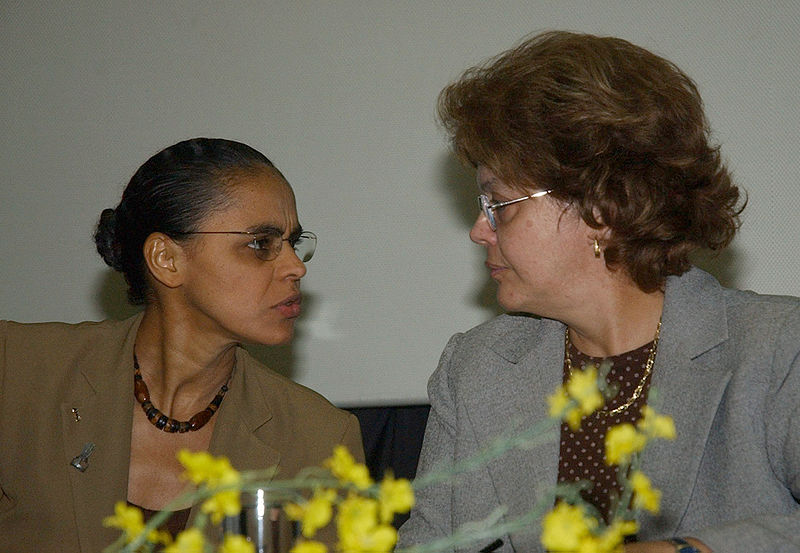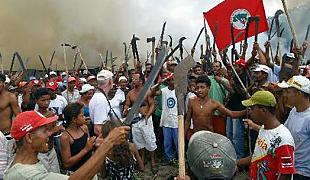The first round of Brazilian presidential elections is over and, against all forecasts, the candidate of the Workers' Party (PT), Dilma Rousseff did not win by landslide in the first round, gathering only 46.6% of the votes.
While her predecessor and mentor Lula remains extremely popular, with some 80% of popular support according to polls, Dilma, former Chief of Staff (Prime Minister) and earlier Minister of Mines and Energy, is something of a grey technocratic figure without the popular appeal of Lula. Worse: she is perceived, with reason, as representing the right wing of the PT, at a time when this party's rule is rather strongly criticized for not being true enough to its working class origins and having drifted into a socialdemocratic liberal stand.
She may be able to appeal somewhat to the center-right voters but in exchange she fails in gathering support from the traditional basis of the PT. Back when she was appointed as candidate, I already said this was the beginning of the end of this party's rule, even if, admittedly she has done better that I expected.
Dilma has not failed to secure the presidency in the first round because of the conservative opposition of the Social Democratic Party (not socialdemocrat but christiandemocrat), which only gathered some 32.8% of the votes but for two other reasons: abstention (18%: very high in a country where voting is compulsory) and the strong appeal of former Minister of Environment Marina Silva, who got almost 20% of the votes casted.
As I mentioned back then, Marina, left Lula's government in 2009 as it had drifted too much towards pure liberal developism, sidelining conservation issues. She felt pushed out of a government that had placed very high in the agenda to satisfy the industrialist and extractivist demands of the bourgeoisie and some sectors of the working class. But, as most Brazilians do not live in the Amazonia and have more pressing concerns, it is surely true that is not just her environmentalist stand what has gathered voters around her, but rather the perception that she is a more genuine kind of left-wing politician. The small Green Party, where she is now, is generally perceived as a too bourgeois party, lacking a class agenda but this has been no obstacle for Marina gathering widespread support.
 |
| Marina and Dilma already had strong differences years ago |
At the moment I do not know how much the candidate of the other left, Socialism and Freedom Party (PSL), considered by some the genuine working class bloc, has gathered, but there's not much left from what the three leading candidates add up to 100% of the votes, so it has clearly failed, at least in the presidential poll.
In the end, this election has been (and I say has been because Dilma Roussef is certain to win in the second round) a confrontation between two strong women with a solid militant past who have to some extent drifted to the center, or even the right if you wish (Dilma is for instance opposed to the right to abortion and openly adheres to capitalism as economic system). While the classical right has managed to keep their base, they are far from being a project with appeal for the Brazilian majority and can well be considered anecdotal and even pointless.
The Landless Movement
An interesting viewpoint is that of which is maybe the best known militant grassroots movement of Brazil: the Landless Movement (MST). In a pre-election interview published at La Haine with one of their leaders, Janaina Stronzake, 32, said:
The main negative aspect of Lula's government was the non-implementation of the agrarian reform, demanded by law, and the privileges given to agro-business, to banks and to multinationals in general.
Lula's government privileged (...) large agricultural production, which concentrates 90% of the agricultural credit, 75% of the lands and only 30% of domestic food production. Meanwhile peasantry only has 25% of the land, access to a mere 10% of agricultural credit and produces 70% of what feeds the country.
Now the Forest Code, which is tailor-made for the demands of the landowners to continue with the deforestation of the Amazonia and other areas of natural preserve, is being promoted. Another important aspect has been the liberalization of transgenic crops (GMOs). (...) We cannot forget that Syngenta [a large GMO corporation] is responsible of the murder of farmer and MST member Valmir 'Kano' Mota, in Paraná in October 2007. Only for this Syngenta should have been thrown away from the country.
However she also has some favorable opinions about Lula's management, specially the Bolsa Familia (welfare program that allows the poorest to survive), the consolidation of universal education and the foreign policy of alliances with other countries of The South. Nevertheless she denounces Brazilian participation in the occupation of Haiti as a shame.
She has nothing good to say about the conservative PSDB party:
In Río Grande, where Serra's party has ruled for the last four years, we get a clear image of what they propose for the whole nation: closure of schools, end of social programs, open and violent repression of farmers and union members...
Besides presidential elections, Brazil also held yesterday many other local, state and national votes, whose results I do not yet know.

Interesting article. So, it seems the classical right is like the classical left, without a "project with appeal for the Brazilian majority and can well be considered anecdotal and even pointless."
ReplyDeleteThe little I know, it seems Marina has some principles few others have there. It would be great if Brazil carries out a real agrarian reform, with plenty of transparency.
I have been looking at the way Norwegians can access information about land property in all their country. Their land property was already well established centuries ago and Norway is a tiny country, but these days we should be able to start a project whereby claims of all types are first registered, there is an open debate about them and decisions be taken.
Land property is totally new in Norway-occupied Lappland. And people do not like the Norwegian cops meddling in their business.
ReplyDeleteAs far as I know in Spanish civil right the only way to have rights to an unregistered property is to effectively occupy (use) it (or being the Catholic Church, whose special mafioso status allows them to claim even public parks). However anti-squatting reforms may have undermined actual occupants rights since I learned about civil right back in the late 80s.
(Basque law may be different anyhow but I did not get to study it).
I think it's best to burn all land claims and allow only effective use possession instead of property. You cannot really own the Earth: you can only use it. I think this is pretty much fundamental anything else is a crime against Morther Earth and Humankind.
What I mean is that land should only be communitarian, never private in a market sense (though it can be possessed and even inherited, as long as the claimants effectively use it within the community democratically-determined rules).